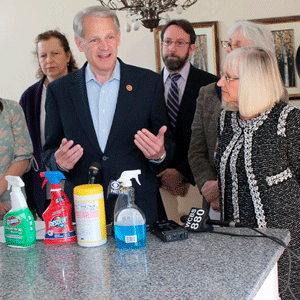 U.S. Rep. Steve Israel wants to make your cleaning products come clean.
U.S. Rep. Steve Israel wants to make your cleaning products come clean.
Israel (D-Huntington) is dismayed that although toxins, carcinogens and allergens exist in everyday cleaning products, current law does not require the disclosure of ingredients in cleaning products.
Just recently, Israel announced the introduction of the Cleaning Product Right to Know Act, legislation that would require ingredient labeling for domestic, commercial and institutional cleaning products.
“When we use cleaning products to clean our homes or our offices we assume they’re good for our health,” Israel said. “However, research has shown that chemicals in these products may, in fact, be harming us. We all have a right to know what’s in the cleaning products we use.”
Judi Bosworth, supervisor of the Town of North Hempstead, said Long Island consumers are more health conscious than ever before—even to awareness about the cleaning products they bring into their homes.
“We all have an obligation to ourselves and our families to know what is contained in these products,” she said, adding that Israel’s legislation “will go a long way in giving consumers the information they need to make the best choices.”
Ken Spaeth, MD, chief of occupational and environmental medicine at the North Shore-LIJ Health System, noted the risks are varied. Some cleaning products are potential carcinogens; others can trigger asthma.
“Since the products often don’t have complete lists of their ingredients, it is hard for consumers to educate themselves about the health risks or identify ingredients that may be affecting them,” he said. “People who are worried about exposure to these chemicals should try to ensure adequate ventilation in rooms where they are used including open windows or fans.”
According to the congressman’s office, a study by Women’s Voices for the Earth, an organization dedicated to eliminating chemicals that are toxic to our health, found that some home cleaning products contained reproductive toxins such as toluene and phthalates, carcinogens such as 1,4-dioxane and chloroform, and a hormone disrupting synthetic musk.
Furthermore, several known allergens were detected in these products, the highest levels of which appeared in air fresheners with fragrance, although allergens were also found in products marketed as fragrance-free. None of these chemicals were listed on the product’s label.
Rep. Israel’s legislation would require full-ingredient labeling on a product or its packaging. Ingredients must be listed in descending order of predominance by weight.
Manufacturers would also be required to provide an online list of each product’s ingredients.
Products covered by the legislation include, but are not limited to: air care products, automotive products, polishes or floor maintenance products, and disinfectants.
Cleaning products whose label does not contain a complete and accurate list of all the product’s ingredients will be treated as a misbranded hazardous substance under the Federal Hazardous Substances Act.































